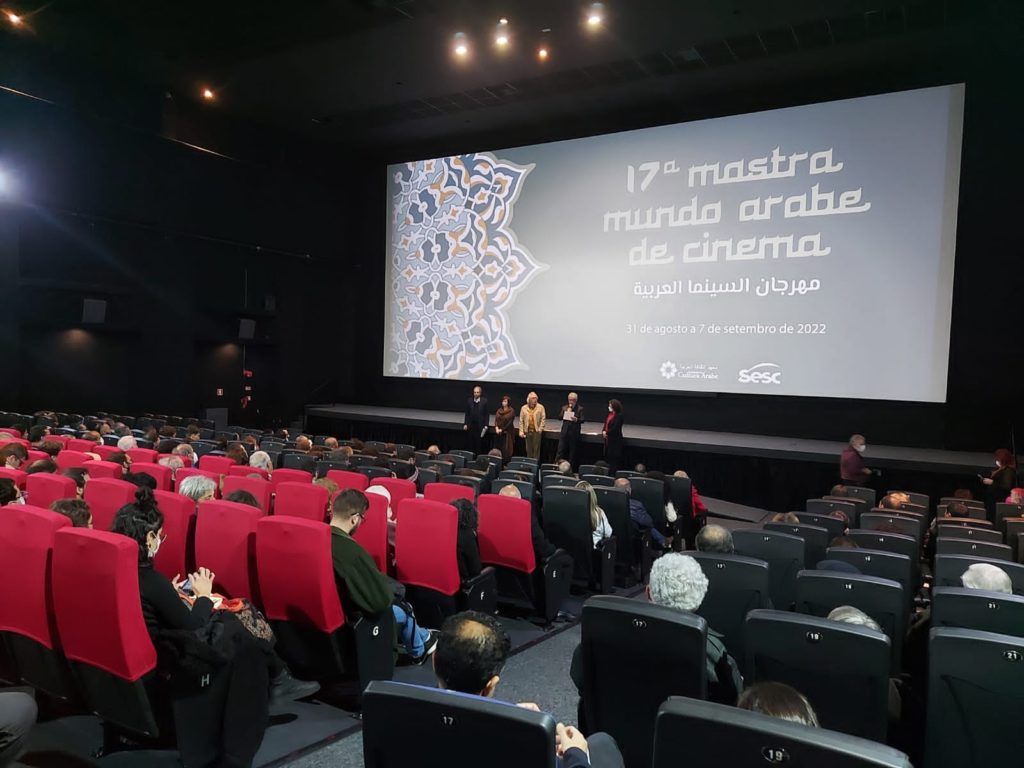São Paulo – The Arab World Film Festival reopened its doors to in-person screenings this year. The opening of the event and the first screening took place this Wednesday (31) at CineSesc in São Paulo. The screenings occurred solely online in the two previous editions due to the COVID-19 pandemic.
The return to in-person format was received with joy by the creators and supporters, who spoke at the opening ceremony. The Festival is co-organized by Brazil’s Arab Culture Institute (ICArabe) and Social Service of Commerce (SESC) in São Paulo and sponsored by the Arab House, the Arab Brazilian Chamber of Commerce’s (ABCC) cultural center, and the Brazilian Sleep Institute.

Soraya Smaili, the founder of ICArabe and creator of the Festival, recalled when the event was created, the cultural and even international scope it has today was not imagined. “We started, me and Simone Yunes, from CineSesc. In 17 years, many movies of our lives have been screened. It is a very emotional moment. We have to thank you for being here and honor all the people who couldn’t be here with us. It was and still is a pandemic, and we have to face it as we courageously face it. Today we are here to celebrate the ancient Arab and Brazilian life and culture, which dialogue in such a harmonious way,” pointed Smaili.
“We have been on this path for 17 years and the right path,” added Gilson Packer, manager of SESC São Paulo.
For Silvia Antibas, cultural director of the ABCC, the event is already part of the cultural calendar in São Paulo. “I am delighted to be here in person. We’ve been partners since the beginning. During this time of the pandemic, we conducted a survey and confirmed there are over 12 million Arab descendants in Brazil; this corresponds to 6% of the Brazilian population. And for us, it is vital to show how we are adapted [in Brazil] and how the Arab people are represented in their diversity in this exhibition,” said Antibas, who is also a historian.
- See the Festival’s full schedule here.
“In the last couple of years in which our planet has undergone political, social, and environmental transformations, cinema was impacted by the COVID-19 pandemic and has shown itself to be resilient. It remained present in our lives in new formats, and now, happily, it reoccupies the rooms and provides us with the collective experience of art appreciation, which we missed so much,” declared Murched Omar Taha, president of ICArabe.

Festival curator Arthur Jafet recalled this year’s selection continued to seek works reflecting issues inherent to the current situation in Arab countries. “These are very recent films, and we have films that deal with COVID. All with a different language, but with an urgent social theme,” he declared in an interview with ANBA.
The first screening was ‘Memory Box,’ a fiction by Lebanese directors Joana Hadjithomas and Khalil Joreige. The work is based on the director’s diaries, who, like the protagonist, also migrated from Beirut to Montreal, Canada, in her youth.
On the first day of the Festival, Jafet said he was surprised by the presence of “CineSesc’s loyal and captive audience and new people interested in the subject of the films.” In total, there are ten works, eight productions with in-person sessions, and three available for online streaming on the SESC Digital platform. The show will also feature online meetings with guests interacting with the public.
Quick facts:
17ª Mostra Mundo Árabe de Cinema [17h Arab World Film Festival]
August 31 to September 7
CineSesc
Rua Augusta, 2075, Cerqueira César
São Paulo – SP
Sesc Digital
Tickets for CineSesc from September 1 to 7: BRL 24 (full) and BRL 12 (students, elderly, and handicapped)
Translated by Elúsio Brasileiro




